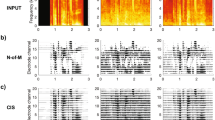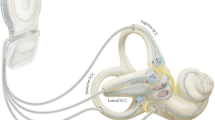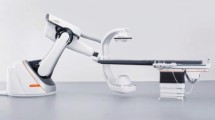Abstract
The objective of our study was to evaluate audiological outcome in cochlear implanted children deafened by meningitis and its correlation with duration of deafness from meningitis in a retrospective clinical study at an academic tertiary referral center. Sixty patients profoundly deafened by meningitis were evaluated. Two groups of children depending on duration of deafness—group 1 defined by duration of deafness less than 6 months and group 2 defined by duration of deafness over 6 months were evaluated. The control group A (duration of deafness <6 months) and group B (duration of deafness >6 months) with similar demographics data and a non-meningitis-related cause of deafness were evaluated. Patient history, cochlear implantation and audiological findings (MAIS, MUSS and open set tests questionnaire) were investigated. Standardized diagnostic and therapeutic procedure was performed in all patients. Our results showed better auditory performance and language control in children implanted within 6 months after meningitis. Over the period of 36 months group 2 was able to catch up with the group 1 in the MUSS and MAIS tests. However, the results of the common phrases test remain significantly better in group 1 over this time period (P = 0.0188). In case of meningitis, audiological and radiological assessment should be performed within 4 weeks after the onset of disease. We see a clear indication for immediate implantation in patients with profound SNHL caused by meningitis. The aim should be bilateral implantation in this population to achieve the best possible performance by implantation before obliteration occurs. Premeningetic auditory experience is an important advantage which should be used. Frequent bilateral and sometimes late obliteration should be taken into consideration in the decision-making process as well.



Similar content being viewed by others
Reference
Telian SA, Zimmerman-Phillips S, Kileny PR (1996) Successful revision of failed cochlear implants in severe labyrinthitis ossificans. Am J Otol 17(1):53–60
Kulahli I, Ozturk M, Bilen C, Cureoglu S, Merhametsiz A, Cagil N (1997) Evaluation of hearing loss with auditory brainstem responses in the early and late period of bacterial meningitis in children. J Laryngol Otol 111(3):223–277
Richardson MP, Williamson TJ, Reid A, Tarlow MJ, Rudd PT (1998) Otoacoustic emissions as a screening test for hearing impairment in children recovering from acute bacterial meningitis. Pediatrics 102(6):1364–1368
Lenarz T (Hrsg.) (1998) Cochlea-implantat. Ein praktischer Leitfaden für die Versorgung von Kindern und Erwachsenen. Springer, Berlin
Kaplan SL, Catlin FI, Weaver T, Feigin RD (1984) Onset of hearing loss in children with bacterial meningitis. Pediatrics 73(5):575–578
Nadal JB Jr (1978) Hearing loss as a sequela of meningitis. Laryngoscope 88(5):739–755
El-Kashlam HK, Ashbaugh C, Zwolan T, Telian SA (2003) Cochlear implantation in prelingually deaf children with ossified cochlea. Otol Neurotol 24:596–600
Richardson MP, Reid A, Tarlow MJ, Rudd PT (1997) Hearing loss during bacterial meningitis. Arch Dis Child 76(2):134–138. Erratum in: Arch Dis Child 76(4):386
Baraff LJ, Lee SI, Schriger DL (1993) Outcomes of bacterial meningitis in children: a meta-analysis. Pediatr Infect Dis J 12(5):389–394
Cohen NL, Waltzman SB (1993) Partial insertion of the nucleus multichannel cochlear implant: technique and results. Am J Otol 14(4):357–361
Dodds A, Tyszkiewicz E, Ramsden R (1997) Cochlear implantation after bacterial meningitis: the dangers of delay. Arch Dis Child 76(2):139–140
Gantz BJ, McCabe BF, Tyler RS (1987) Use of multichannel cochlear implants in obstructed and obliterated cochleas. Otolaryngol Head Neck Surg 98:72–81
Balkany T, Luntz M, Telische F, Hoges AH (1997) Intact canal drill-out procedure for implantation of the totally ossified cochlea. Am J Otology 18(Suppl 6):58–59
Lenarz T, Battmer RD, Lesisnski A, Parker J (1997) Nucleus double array: a new approach for ossified cochlea. Am J Otology 18(Suppl 6):39–41
Lenarz T, Buchner A, Tasche C, Cristofoli T, Lesinski-Schiedat A, Wallenberg EV, Battmer RD, Busby PA, Frohne C (2002) The results in patients implanted with the nucleus double array cochlear implant: pitch discrimination and auditory performance. Ear Hear 23(Suppl 1):90S–101S
Lesinski-Scheidat A, Rühle S, Bertram B, Lenarz T (2005): Bilateral implantation and bimodal fitting in young children: a comparison study. APSCI 2005, 26, 28.11.05, Hong-Kong
Lenarz T (Hrsg.) (1998) Cochlea-Implantat. Ein praktischer Leitfaden für die Versorgung von Kindern und Erwachsenen. In: Bertram B (ed) Rehabilitationskonzept bei Kindern, Springer, Berlin, pp 108–121 Chap 7
Lenarz T, Hartrampf R, Battmer RD, Bertram B, Lesinski A (1996) Cochlear implant management of young children. Laryngorhinootologie 75(12):719–726
Robbins AM, Renshaw JJ, Berry SW (1991) Evaluating meaningful auditory integration in profoundly hearing-impaired children. Am J Otol 12(Suppl 12):144–150
Robbins AM, Osberg MJ (1990) Meaningful use of speech scale (MUSS). Indiana University of School of Medicine, IN
Robbins AM (1993) Mr Potato Head Task. Indiana University of Medicine, IN
Haskins J (1949) Kindergarten phonetically balanced word lists (PBK). Auditec, St. Louis
Illg A, von der Haar-Heise S, Goldring JE, Lesinski-Schiedat A, Battmer RD, Lenarz T (1999) Speech perception results for children implanted with the CLARION cochlear implant at the Medical University of Hannover. Ann Otol Rhinol Laryngol Suppl 177:93–98
Novak MA, Fifer RC, Barkmeier JC, Fritz JB (1990) Labyrinthine ossification after meningitis: its implications for cochlear implantation. Otolaryngol Head Neck Surg 103:251–256
Fortnum H, Hull D (1992) Is hearing assessed after bacterial meningitis? Arch Dis Child 67:1112–1114
Riordan A, Thompson A, Hodgson J (1993) Children who are seen but not referred: hearing assessment after bacterial meningitis. Br J Audiol 27:375–377
Muren C, Bredberg G (1997) Postmeningitic labyrinthine ossification primarily affecting the semicircular canals. Eur Radiol 7(2):208–213
Green JD Jr, Marion MS, Hinojosa R (1991) Labyrinthitis ossificans: histopathologic consideration for cochlear implantation. Otolaryngol Head Neck Surg 104(3):320–326
Steenerson RL, Gary LB, Wynens MS (1990) Scala vestibuli cochlear implantation for labyrinthine ossification. Am J Otol 11(5):360–363
Lenarz T, Lesinski-Schiedat A, Weber BP, Issing PR, Frohne C, Buchner A, Battmer RD, Parker J, von Wallenberg E (2001) The nucleus double array cochlear implant: a new concept for the obliterated cochlea. Otol Neurotol 22(1):24–32
Bredberg G, Lindström B, Löppöen H, Skarzynski H, Hyodo M, Sato H (1997) Electrodes for ossified cochlea. Am J Otology 18(Suppl 6):42–43
Hartrampf R, Dahm MC, Battmer RD, Gnadeberg D, Strauss-Schier A, Rost U, Lenarz T (1995) Insertion depth of the nucleus electrode array and relative performance. Ann Otol Rhinol Laryngol Suppl 166:277–280
Mitchell TE, Psarros C, Pegg P, Rennie M, Gibson WP (2000) Performance after cochlear implantation: a comparison of children deafened by meningitis and congenitally deaf children. J Laryngol Otol 114(1):33–37
Joseph G, Rost U, Strauss-Schier A, Buechner A, Lenarz Th (2006) Development of speech production in cochlea implant patients since 1984 up to now. German Medical Science
Wellman MB, Sommer DD, McKenna J (2003) Sensoneural hearing loss in postmeningitic children. Otol Neurotol 24:907–912
Reuter G (1997) Untersuchungen zur Aufhebung von neonatalen Deprivation durch cochlear implant: Sinnesersatz bei gehörlosen Kindern. PhD Thesis at the Medical University Hannover
Eimas PD, Siqueland ER, Jusczyk P, Vigorito J (1971) Speech perception in infants. Science 171(968):303–306
Werker JF, Tees RC (1984) Cross-language speech perception: evidence for perceptual reorganization during the first year of life. Infant Behav Dev 7:49–63
Acknowledgment
The authors would like to thank Jana Prokein, Department of Biometry and Medical Informatics of the Medical University of Hannover, for her assistance with data analysis.
Author information
Authors and Affiliations
Corresponding author
Rights and permissions
About this article
Cite this article
Durisin, M., Arnoldner, C., Stöver, T. et al. Audiological performance in cochlear implanted patients deafened by meningitis depending on duration of deafness. Eur Arch Otorhinolaryngol 265, 381–388 (2008). https://doi.org/10.1007/s00405-008-0584-1
Received:
Accepted:
Published:
Issue Date:
DOI: https://doi.org/10.1007/s00405-008-0584-1




